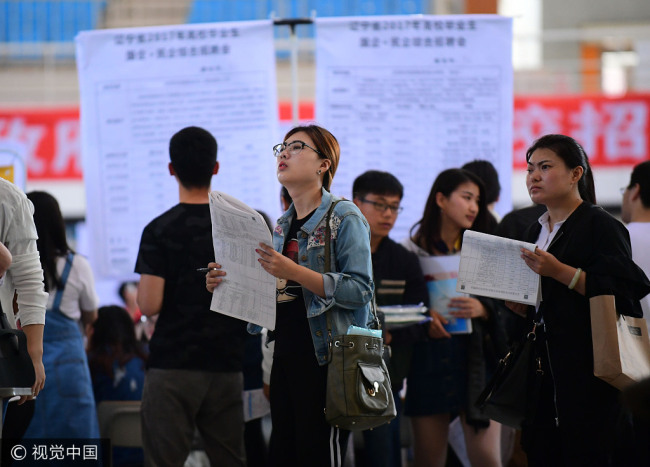
From the People’s Daily app.
And this is Story in the Story.
The jobs prognosis is good for Chinese university students who will graduate in 2019.
More jobs are available this academic year, according to a report by online recruitment platform Zhaopin.com. The report said the ratio of jobs to job hunters was 2.68-to-1 in the first 11 months of the year, compared with 1.78-to-1 in the same period last year.
The report was based on job openings from various enterprises, including small and micro businesses, and the job intentions of more than 1 million registered students.
Job hunters grew by 21 percent year-on-year while the number of job positions increased by 81 percent, the report said.
"The majority of those new jobs were in the education, consulting, internet, e-commerce, media and culture industries," said Li Qiang, a senior consultant at Zhaopin.com.
Today’s Story in the Story looks at where the best job opportunities are.

"New" members of China's elite "first-tier city club" have rolled out a slate of favorable policies to attract university graduates. (File Photo: China Plus)
The import and export industry is showing a strong demand for talent, with the ratio of jobs to job hunters in the industry increasing to 1.81 this year, compared with 0.71 last year.
However, it was harder to get a job in the internet and e-commerce industry, as the pool of candidates grew faster than job openings. The industry of ratio of jobs to candidates this year was 2.7 to 1, down 0.09 from last year.
"There are plenty of job opportunities for university graduates," said Chen Yu, deputy director of the China Association of Employment Promotion.
Chen believes that job growth in the service industry is a result of people's booming demands in life, brought on by the country's economic development.
"The service industry needs more workers to provide higher quality services for people when the economy develops to a certain degree," he said. "For example, many young people enjoy fitness, so the job of personal trainer is popular."
The Zhaopin report also said the number of job positions in private enterprises increased 109 percent, showing they were thirstier than ever for talent.
A career service teacher surnamed Chen at Sichuan University in Southwest China said the university's graduates have paid a lot of attention to private businesses, including small ones.
"Our students have strong passions for those companies when seeking jobs," she said. "This year our university held three specialized job fairs, and more than 100 small and micro businesses from all over the country attended. We never held such a specialized event before."

Job seekers at a job fair in Shenyang, Liaoning Province, on May 13, 2017. (File Photo: China Plus)
As an added incentive, the Ministry of Education has introduced a package of preferential policies to help college students graduating in 2019 find jobs or start businesses.
The package includes 19 measures designed to offer better support to graduates or companies employing them, according to a circular published by the ministry.
It pledged to work with other authorities in offering training allowances and tax concessions to micro, small or medium-sized companies hiring new graduates.
A total of 8.34 million college students are expected to graduate in 2019 and about four out of five of them say they are willing to work. That is 6.39 percent more than the previous year, according to an employment survey report.
Although he was admitted to a postgraduate program at China Foreign Affairs University, Zhu Xiaowei, a recent graduate of the same university, has chosen instead to work for a media company after graduation.
"Good offers seldom come twice," he said. "To work for an established company instead of furthering my study or starting my own business will help me become more competitive in the job market and more financially self-reliant.
"In the increasingly complex and changing job market, graduates are more cautious in planning career," Zhu added.
Despite the booming urban development in China, graduates still have their eyes focused on traditional first-tier cities.
A survey by Zhaopin.com shows only 37.5 percent of China's new university graduates would hope to work in cities outside Beijing, Shanghai, Guangzhou and Shenzhen.
However, these new graduates are now being actively sought after by China's 'new' first-tier cities. In an effort to attract them, these cities have been developing new policies and providing increased benefits which might appeal to new university graduates.
(Produced by Nancy Yan Xu, Brian Lowe, Lance Crayon, and Da Hang. Music by: bensound.com. Text from China Daily, Xinhua, CGTN, and China Plus.)


